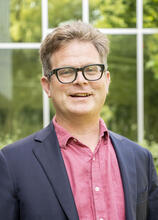Sometime in 1993, in pursuit of a good mark in Reformation History, I went to my professor’s office to discuss an essay topic. Hoping to appear studious, I took copious notes during the meeting—until Professor Werner Packull told me to stop, in words I’ll never forget:
“Put your pen down,” he said. “I’m not here to give you the answers; I’m trying to broaden your mind.”
Werner Packull began as a professor of History at University of Waterloo in 1972, first at Renison College and, from 1983 to 2003, at Conrad Grebel. He died in 2018.
Specializing in the Radical Reformation, he was a co-author on the 1975 “polygenesis paper,” which completely transformed how historians think about Anabaptist-Mennonite origins.
As a History major at Grebel in the early 1990s, I took every single course that Packull taught. Along with many other former students, I remember him as a man who was very generous with his time and patient with his students. Originally trained as a tradesman, he approached history as a craft. Being in Werner’s class was like being apprenticed by a highly skilled craftsman—a master who believed that you could do it too, with hard work and practice. 
Packull offered his students a somewhat tragic understanding of history, in which humanity’s best-laid plans frequently went wrong. A key insight from his popular course on Modern Revolutions was that all political and social revolutions have their excesses, missteps, and innocent casualties—no matter how righteous the cause. He taught us to beware of ideological approaches to history (whether from the ‘left’ or the ‘right’) that prioritize theories over facts. His former student Edmund Pries put it this way, in an essay written to honour Packull’s retirement: “As an historian, he wants the story to be told the way it should be told, wrinkles and all. He has little patience for those who would colour history in order to manipulate it for other purposes.”
In the unsettled times we are now living through, I greatly miss Werner’s voice. But his teaching still informs my thinking, and it provides a framework for understanding the world today. Among other things, learning about the worst moments in history with Werner has provided helpful perspective: humanity has faced crisis before, and has endured.
Despite the tragic lens through which he viewed the past, Packull’s classes were inspiring. Former student Josie Winterfeld told me, “I had never been a fan of history, but one class with Werner Packull changed that.... I left many of his classes with something new to think about, a bit of fire burning in my belly, and considering the kind of world I wanted to live in, and my role in helping to shape it.”
That’s one reason we’re committed to teaching history at Grebel—to provide students with mind-broadening perspectives on the past in order that they might understand the present and help shape a better future. And our faculty continue Werner’s craft—teaching students with patience, kindness, and a generous spirit.





